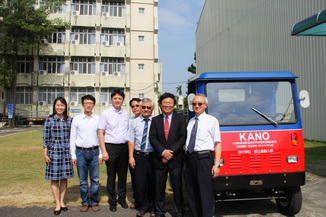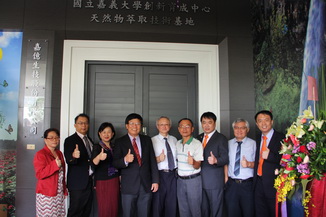| |
 |
News |
 |
Browsing: 2642 times

|
Date:2016-11-05
Bracket:2016 NCYU News
Department:ncyu
|

 NCYU Helps Create Business Opportunities by Establishing Natural Extraction Technology Base to Develop Diesel-Electric Hybrid Agricultural Transport Vehicle
To celebrate the 97th anniversary of National Chiayi University on Nov. 5th, an unveiling ceremony for “Natural Extraction Technology Base” took place at the restaurant on the Linsen campus on Nov. 3rd at 9:30 a.m. Hosted by NCYU President Chiou Yi-Yuan, the ceremony also featured the announcement of “diesel-electric hybrid transport vehicle for agricultural use,” developed jointly by an inter-institution research team led by Prof. Chyung Ay, Vice President for Academic Affairs. The event allows the guests to experience the functions of transport vehicles.
NCYU Helps Create Business Opportunities by Establishing Natural Extraction Technology Base to Develop Diesel-Electric Hybrid Agricultural Transport Vehicle
To celebrate the 97th anniversary of National Chiayi University on Nov. 5th, an unveiling ceremony for “Natural Extraction Technology Base” took place at the restaurant on the Linsen campus on Nov. 3rd at 9:30 a.m. Hosted by NCYU President Chiou Yi-Yuan, the ceremony also featured the announcement of “diesel-electric hybrid transport vehicle for agricultural use,” developed jointly by an inter-institution research team led by Prof. Chyung Ay, Vice President for Academic Affairs. The event allows the guests to experience the functions of transport vehicles.
Vice President Chyung Ay initiated the integration of research teams from the NCYU Department of Biomechatronic Engineering and Department of Mechanical and Energy Engineering, and from Southern Taiwan University and National Cheng Kung University. The integrated team has obtained subsidies from the Academic Technology Development Program, Council of Agriculture, with the 3-year the research project themed “Agricultural Diesel Engine Diesel-electric Hybrid System Development” in 2015. The recent result diesel-electric hybrid transport vehicle for agricultural use is the first self-developed diesel-electric hybrid system at home. The transport vehicle, capacity to load 1,000 kilograms, is driven mainly by a diesel engine, supplemented by an electric motor. In indoors environments (i.e. a fruit and vegetable market), it can be driven in a pure power mode without pollution or noise (mode M). A pure oil mode (mode D), which can cater to large torque, can be adopted when operating the vehicle on an agricultural road. It can also be propelled in diesel-electric mode (mode H). Switchable modes make it easier to drive the vehicle in different conditions. The hybrid transport vehicle also responds to the concept of saving energy and reducing carbon emissions for the planet.
According to Prof. Ay, the research and development team have received two new patents for “a buck-boost bidirectional full-bridge low-loss zero-voltage switching conversion system” and “a highly efficient transmission configuration for a low-power hybrid system.” They are now applying for a patent for “a power transmission line control planning system for diesel-electric hybrid transport vehicles.” Prof. Ay said large-scale fruit and vegetable markets in Taiwan, such as Hsilo Agricultural Product Market, have approximately 2,000 stalls and 800 transport vehicles, which cause severe noise and air pollution from day to day. To solve the problems, the government has set up a subsidy program for electric transport vehicles, but only with limited effects. The research and development team therefore has been transferring technological breakthroughs of research and development to the industry, hoping to attract more companies to consider the possibility of utilizing the technology.
Prof. Ay indicated that most of the traditional agricultural machines are propelled by diesel engines. Promoting the use of electric agricultural machines is part of the recent effort to reduce carbon dioxide emissions. Due to insufficient torque, as they have found, electric agricultural machines fail to fully replace the use of high-torque cultivators, tillers or other machines operating in the farms. Under a high load, the driving speed of electric agricultural machinery, especially in the forms of spraying vehicles and agricultural transport vehicles, is not able to meet the requirements of agricultural operations. As far as the market goes, hybrid cars are gradually gaining popularity with consumers and have enjoyed increasing sales due to better fuel-efficiency and environmental friendliness than normal, traditional vehicles. The application of the diesel-electric hybrid system to a wide spectrum of agricultural machinery, which has just been realized by the team in creating the hybrid transport vehicle, becomes a necessary trend due to eco- and carbon-friendly concerns.
Grounded on the existing research related to natural active ingredients, NCYU has encouraged companies to inject funds and founded the innovative company called “JiaYi Biotechnology Inc.” In a joint effort, they have also established “Natural Extraction Technology Base” on the Linsen campus as an internship factory for enlargement of raw material extraction process and commercialization of teacher research results. Recently, the Base has developed a process for extracting astaxanthin from shrimp shells, and a number of enterprises have placed orders for production.
According to Chen Cheng-Nan, Chairman of the NCYU Enterprise Incubation Center, the Natural Extraction Technology Base is characterized by customizing production of medicines, foods, cosmetics and others based on different attributes of the raw materials via an extraction process that boasts high frequency, high pressure and low temperature, which also helps reduce heavy metal and pesticide residues. The quality verification center at NCYU also allows the companies to ensure the quality of the raw materials in the shortest time possible. Supervised by the Enterprise Incubation Center, the Base was set up jointly with the enterprises, and aims to create a dialogue between academic and industrial sectors, hoping to offer on-site opportunities to students before graduation. They also invited a senior manager from the industry to serve as full-time director of the Base, which boasts a clean room fully compliant with plant specifications, and has obtained ISO 22000 and HACCP certifications. Products collaborated by the Base and companies such as Fungus Biotech, BenCaoJi Biotech, Hsu’s Ginseng Enterprises, Inc., TURI Trading Company Ltd., and Ying Yue Trading Company Ltd., are on display at the Base. The goal is to bridge the gap between research and development results and industrial practice.
As mentioned by Chairman Chen, the Base enables the NCYU teachers to conduct studies on the mass production process, and the companies to capitalize on the results of research and development in solving the mass production problems and reducing costs arising from technology transfer. In the days to come, above all, the Base will assist the client companies to increase their capitals and be stationed in science parks in a more mature stage. Despite limited resources, the ultimate goal is to create a win-win situation for both the academic and industrial sectors by implementing one-stop integrated services for enterprise incubation.
Jiaonong Foods is a company founded by the Department of Aquatic Biosciences, College of Agricultural and Life Sciences, NCYU, Tosei Seafoods Co., Ltd., a client company of the Enterprise Incubation Center, and NCYU alumnus. To create synergy among local industries, government and academic organizations, and added values from local resources, Jiaonong Foods produces the fermented product of fish sauce with fish sub-resources from Tosei Seafoods through academic and technical cooperation this year, thus realizing the objective of developing value-added products from fish sub-resources.
Department of Microbiology, Immunology and Biopharmaceuticals, Taiwan Forestry Research Institute Chungpu Research Center, and Yat Wong International Limited, a client company of the Enterprise Incubation Center, have also been working together to develop Canangium odoratum Bail from the flowers of Canangium odoratum Bail of the Chungpu Research Center, and skincare products from seed oil of Alexandrian laurel. A display of the products on the venue allowed the participants to taste and use the samples.
|
 |

|
 |
|
 |
 |
|
